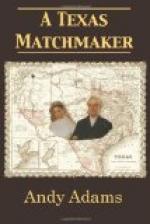“Shucks, Tom,” said he, the next morning after his return, as we were sitting in the shade of the corrals waiting for the remuda to come in, “that poor little country girl might as well be in a penitentiary as in that school. She belongs on these prairies, and you can’t make anything else out of her. I can read between the lines, and any one can see that her education is finished. When she told me how rudely her mother had treated you, her heart was an open book and easily read. Don’t you lose any sleep on how you stand in her affections—that’s all serene. She’ll he home on a spring vacation, and that’ll be your chance. If I was your age, I’d make it a point to see that she didn’t go back to school. She’ll run off with you rather than that. In the game of matrimony, son, you want to play your cards boldly and never hesitate to lead trumps.”
To further matters, when returning by stage my employer had ingratiated himself into the favor of the driver in many ways, and urged him to send word to Mrs. McLeod to turn in her two-year-olds on his contract. A few days later her foreman and son-in-law, Tony Hunter, rode down to Las Palomas, anxious for the chance to turn in cattle. There had been little opportunity for several years to sell steers, and when a chance like this came, there would have been no trouble to fill half a dozen contracts, as supply far exceeded demand.
Uncle Lance let Mrs. McLeod’s foreman feel that in allotting her five hundred of the younger cattle, he was actuated by old-time friendship for the family. As a mark of special consideration he promised to send the trail foreman to the San Miguel to pass on the cattle on their home range, but advised the foreman to gather at least seven hundred steers, allowing for two hundred to be culled or cut back. Hunter remained over night, departing the next morning, delighted over his allowance of cattle and the liberal terms of the contract.
It was understood that, in advance of his outfit, the trail foreman would come down by stage, and I was sent into Oakville with an extra saddle horse to meet him. He had arrived the day previous, and we lost no time in starting for Las Palomas. This trail foreman was about thirty years of age, a quiet red-headed fellow, giving the name of Frank Nancrede, and before we had covered half the distance to the ranch I was satisfied that he was a cowman. I always prided myself on possessing a good eye for brands, but he outclassed me, reading strange brands at over a hundred yards, and distinguishing cattle from horse stock at a distance of three miles.’
We got fairly well acquainted before reaching the ranch, but it was impossible to start him on any subject save cattle. I was able to give him a very good idea of the remuda, which was then under herd and waiting his approval, and I saw the man brighten into a smile for the first time on my offering to help him pick out a good mount for his own saddle. I had a vague idea of what the trail was like, and felt the usual boyish attraction for it; but when I tried to draw him out in regard to it, he advised me, if I had a regular job on a ranch, to let trail work alone.




